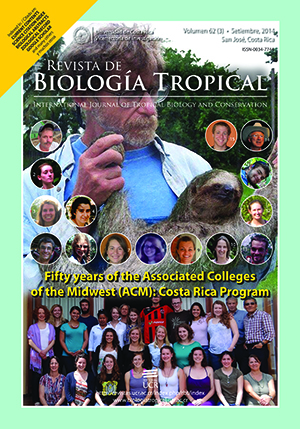Abstract
Pineapple farms make up 45 000ha of Costa Rican landscape and are the second most exported crop. This is economically beneficial for the Costa Ricans, but greatly affects the natural flora and fauna because it is such a low growing crop. This study examined the differences in insectivorous bat species diversity and activity in the habitat gradient between the forest in Tirimbina Biological Reserve in La Virgen de Sarapiquí, Heredia, Costa Rica and the nearby pineapple farm called Finca Corsicana. Over a four week period in March and April 2013, ultrasonic recorders were placed at different sites to pick up the bats’ calls. Then the recordings were analyzed to identify the species. There were four families present and 19 different species. There was a significant decrease in the number of bat passes (the number of times a bat passes the recorder) in the pineapple farm (=22.6), in comparison to the border (=39.9), and the forest (=44.2) (p=0.0028). Agricultural environments affected and lowered bat presence. Also, a greater mean number of bats recorded between 1900-1930hrs compared to 1730-1800hrs, coincided with the setting of the sun and beginning of bat activity. More research is need throughout the night and the year to establish clearer patterns of bat use and activity in different habitats.
Amanda Cormier1
1Colorado College 902 North Cascade Avenue, Colorado Springs, CO, 80946, USA; amanda.l.cormier@gmail.com
##plugins.facebook.comentarios##

This work is licensed under a Creative Commons Attribution 4.0 International License.
Copyright (c) 2014 Revista de Biología Tropical






